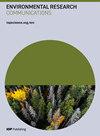Unraveling the environmental consequences of trade openness in South Africa: a novel approach using ARDL modeling
IF 2.9
4区 环境科学与生态学
Q3 ENVIRONMENTAL SCIENCES
引用次数: 0
Abstract
Free trade and environmental sustainability are currently top economic and environmental research priorities. While numerous theories connect trade openness with environmental quality, empirical evidence often fails to support these claims. Using data spanning from 1980 to 2020, our study examines the effect of trade openness on CO2 emissions in South Africa. By employing a novel ARDL modeling framework, our analysis confirms the presence of the Environmental Kuznets Curve (EKC) hypothesis in South Africa. Our findings reveal that while GDP square enhances environmental quality, trade openness and economic growth have a degrading effect over time. Additionally, the study identifies that energy consumption, FDI, and value-added activities all contribute to environmental degradation. Findings also highlights the influence of institutional quality on the environment, demonstrating that political stability and control of corruption lead to increased CO2 emissions, while the rule of law reduces CO2 emissions. The research suggested that the potential of green economies should be leveraged in developing renewable energy, sustainable development, the recycling industry, and green financing sectors. A shift in economic activity in this direction will thus foster long-term economic growth and sustainable development.揭示南非贸易开放的环境后果:使用 ARDL 模型的新方法
自由贸易和环境可持续性是当前经济和环境研究的重中之重。虽然有许多理论将贸易开放与环境质量联系在一起,但经验证据往往无法支持这些说法。我们的研究利用 1980 年至 2020 年的数据,考察了贸易开放对南非二氧化碳排放的影响。通过采用新颖的 ARDL 模型框架,我们的分析证实了南非存在环境库兹涅茨曲线(EKC)假说。我们的研究结果表明,虽然 GDP 方阵会提高环境质量,但贸易开放度和经济增长会随着时间的推移而产生退化效应。此外,研究还发现,能源消耗、外国直接投资和增值活动都会导致环境退化。研究结果还强调了制度质量对环境的影响,表明政治稳定和腐败控制会导致二氧化碳排放量增加,而法治则会减少二氧化碳排放量。研究建议,应利用绿色经济的潜力发展可再生能源、可持续发展、回收行业和绿色融资部门。因此,经济活动向这一方向转变将促进长期经济增长和可持续发展。
本文章由计算机程序翻译,如有差异,请以英文原文为准。
求助全文
约1分钟内获得全文
求助全文

 求助内容:
求助内容: 应助结果提醒方式:
应助结果提醒方式:


